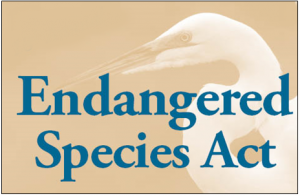
The positive and negative impacts of the Endangered Species Act (ESA) will be examined by a special working group within the House Resources Committee.
The goal of the working group is to seek answers to the following questions:
- How is ESA success defined?
- How do we measure ESA progress?
- Is the ESA working to achieve its goals?
- Is species recovery effectively prioritized and efficient?
- Does the ESA ensure the compatibility of property and water rights and species protection?
- Is the ESA transparent, and are decisions open to public engagement and input?
- Is litigation driving the ESA? Is litigation helpful in meeting ESA goals?
- What is the role of state and local government and landowners in recovering species?
- Are changes to the ESA necessary?
In the spirit of cooperation, here are a few suggestions on locations where they might hold field hearings to find out the answers to some of these very questions.
The committee should go to the small town of Mendota, California. Lying about 35 miles west of Fresno on some of the richest farmland in the world, Mendota has been ravaged economically over the past few years with unemployment rates hovering around 40 percent.
The problem is water, or lack of it. You see farmers on the west side of the gigantic San Joaquin Valley, one of the nation’s primary producers of nuts, fruits and vegetables, have been told that the water needed to irrigate their fields cannot be supplied from the Sacramento delta region in the quantity they need due to a federal court ruling that requires the lifeblood of the Valley be flushed out to the Pacific Ocean in an attempt to help the endangered Delta smelt.
The working group might interview the thousands of primarily Hispanic idle workers and get their opinion of the Endangered Species Act that puts a fish ahead of their dignity and the ability to get honest work.
The committee should go to one of the many logging ghost towns in the northwest. Once thriving towns whose timber industry was destroyed by a ruling the logging could not occur due to the endangered Northern Spotted Owl.
Now, twenty years later, it has been discovered that logging actually helped the endangered owl by allowing it to see potential prey better. The real culprit is the encroachment of the larger Northern Barred Owl on the habitat.
Hopefully the working group can get to the bottom of how faulty science could have been used by the U.S. Fish & Wildlife Service and the Courts to destroy communities and a way of life all in a misguided and counterproductive attempt to help a species under the Endangered Species Act.
The committee should go to areas where private timberland owners in North Carolina have been battling to be able to harvest their renewable resource because it has become the habitat of the endangered red cockaded woodpecker.
These are just a few of the areas that the committee should explore to learn more about how the broadest possible application of the ESA has impacted communities, private property rights and in some cases has actually harmed the species recovery itself.
The working group should seek to create a legal bridge between the current draconian law and an alternative that establishes a balance between protecting endangered species and the rights of people who live around them.
Travelling to see for themselves and hear from the people who have been harmed by the current system that wipes out logging or farming communities all in the guise of conducting an experiment that might marginally help an endangered species would be beneficial to the group, but also shine a light on potential necessary reforms needed in the law.
Rick Manning is the Vice President of Public Policy and Communications for Americans for Limited Government.







